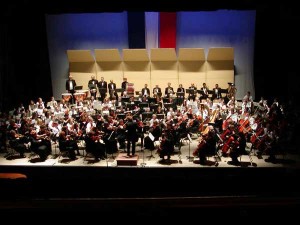Refuting the “Orchestra Job or Nothing” Mentality
 Many of you may have heard of musicschoolcentral.com–a fantastic site launched earlier this year with the intention of assisting prospective music majors in finding a school and degree program that best suits their individual interests. Its founder, Bill Zuckerman, has done a wonderful job covering the musical school scene from multiple angles, providing posts and commentary on topics ranging from the college application process to career prospects. In the latter area, he has recently published a painstakingly-researched post entitled, “What Can You Do With a Music Degree? 70+ Careers and Salaries Revealed.” Wow! 70+?? So much for living in a box, eh? Zuckerman has done his homework, too–over the course of five long pages, he lists a job description and median salary for each of those 70 + potential job positions, which include everything from “Chamber Musician” to “Music Curator” to “Social Media Strategist.” Yes, some of these positions might require additional training or even a non-music concentration or degree, Zuckerman acknowledges, but it is evident that “the myth of ‘you can only teach or play in an orchestra with your music degree’ is exactly that – a myth!”
Many of you may have heard of musicschoolcentral.com–a fantastic site launched earlier this year with the intention of assisting prospective music majors in finding a school and degree program that best suits their individual interests. Its founder, Bill Zuckerman, has done a wonderful job covering the musical school scene from multiple angles, providing posts and commentary on topics ranging from the college application process to career prospects. In the latter area, he has recently published a painstakingly-researched post entitled, “What Can You Do With a Music Degree? 70+ Careers and Salaries Revealed.” Wow! 70+?? So much for living in a box, eh? Zuckerman has done his homework, too–over the course of five long pages, he lists a job description and median salary for each of those 70 + potential job positions, which include everything from “Chamber Musician” to “Music Curator” to “Social Media Strategist.” Yes, some of these positions might require additional training or even a non-music concentration or degree, Zuckerman acknowledges, but it is evident that “the myth of ‘you can only teach or play in an orchestra with your music degree’ is exactly that – a myth!”
Reading that last sentence, I found myself nodding in agreement, because in spite of all of today’s buzz about entrepreneurship and innovation, there still exists this “orchestra job or nothing” mentality within some of our most venerated musical institutions. I well remember my first orchestral excerpt class in college, during which the professor spent a good five minutes making everyone feel increasingly uncomfortable as he asserted with absolute seriousness that this would be the most important class we took at the conservatory, because securing an orchestra job would be our best chance at stable employment. He then distributed a binder full of excerpts that was slightly larger than Encyclopedia Brittanica, told us to practice Beethoven 5 for the next class, and walked out. Needless to say, nobody left the classroom feeling very encouraged.
Now, to be clear, I had great respect for this teacher, who was a successful orchestral musician, and certainly didn’t disagree with his attitude towards the class, as it is of course very difficult to succeed in the contemporary orchestra scene. But I greatly disagree with the idea that the orchestra job, or maybe teaching, is one’s only hope for success–and this article by Zuckerman pretty much destroys the notion entirely. What’s more, I am living proof of its validity. Since I graduated from Eastman, I have been quite busy serving variously as a blogger/writer, cello teacher, chamber musician, chamber coach, and improvisation instructor–all for a salary. Additionally, I’ve started a website, which has been become an important part of my musical life even though it doesn’t presently generate income. Would I love to play in a great orchestra? Of course! But right now, these are the things I wish to pursue, and my studies at NEC and Eastman have prepared me well for all of them.
So, I highly advise you to check out Zuckerman’s list. It is a great example of the myriad opportunities available to an aspiring musician cognizant of the realities of the modern field, and I am personally very encouraged to see more and more musicians demonstrating an astute awareness of the potential inherent in those realities.

